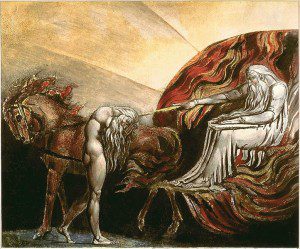 J. Richard Middleton has thought-provoking post at BioLogos that deals Evolution and the Historical Fall (now a couple of weeks old, but I only read it in the last few days). This short essay is well worth reading, and worth some comment here.
J. Richard Middleton has thought-provoking post at BioLogos that deals Evolution and the Historical Fall (now a couple of weeks old, but I only read it in the last few days). This short essay is well worth reading, and worth some comment here.
(1) A historical Fall. Richard, like many of the rest of us, finds the biblical and empirical case for a Fall of some sort compelling. He points out that the the Scriptures clearly teach a fallen humanity. But it goes a little deeper than this:
It has always been important to me that the Bible claimed that the world God created was good (indeed, “very good”; Gen. 1:31), and that evil was later introduced into this world by human disobedience. This notion of a historical Fall, which denies a pre-existing principle of evil and lays the origin of evil clearly at the feet of humanity, distinguishes the biblical version of creation from other accounts of origins. Yet it has become de rigueur among many Christian proponents of evolutionary creation to deny the classical doctrine of a historical Fall and to claim that Homo sapiens emerged in a sinful state. However, I don’t think this is a necessary move for those who want to affirm the truth of the Bible and an evolutionary account of human origins.
It isn’t completely clear from the essay, but I think that Richard is looking at human evil, an inclination to disobedience, violence, and oppression, rather than the origin of every phenomenon that might be called “evil.” We were not created sinful, we were created to be the image of God and in communion with God, but we are undeniably sinful and have been throughout all of remembered or recorded history. He suggests that the narrative of Genesis 3 and following depicts a progression of temptation and disobedience. Among other things God assumes that Cain can do what is right, and tells him that he must master the sin that crouches at his door. Sin develops and grows in the opening chapters of Genesis, but it is not a “quasi-genetic” transmission. More likely it is a cultural communal transmission. “Rather than an immediate change in human nature, the narrative of Genesis portrays a process by which humans come more and more under the sway of sin.”
(2) A possible scenario. Richard gives a possible evolutionary scenario for the fall. (Perhaps not strictly ‘evolutionary’, rather compatible with evolution and with neuroscience.) He makes a suggestion along the lines of the point I was trying to make at the end of my last post “Should Naturalism Define Science?” If there is a God, and he is in relationship with humans, this will change humans in a profound way.
Although we can’t know exactly when Homo sapiens first became aware of the prodding of conscience, we can speculate that at some point God entered into a relationship with some representative population of early humans, calling them to live as his image in the world (for more on the imago Dei as a calling or vocation, see The Liberating Image: The Imago Dei in Genesis 1). This new relationship (with its concomitant ethical call) would have engendered a significant change in the consciousness of Homo sapiens and then in their behavior.
We know from experience that relationships change us, sometimes decisively. No one who enters into marriage or becomes a parent is the same after (at least, if we take the relationship seriously). Even our pets change us; and evolutionists have discussed how various human-animal relationships may have led to significant adaptations in human behavior.
Being in relationship thus puts certain (explicit or implicit) demands on us; and as we respond to the other we begin to change, not only in our actions, but also in our thinking and our values. We now know that behavioral changes begin to lay down new neural pathways in the brain; we quite literally become different people over time.
Perhaps humans became differentiated as “spiritual” beings through relationship with God, and were given the calling to be his image in the world. The fall is a result of both moral consciousness and sinful resistance that spread throughout the entire community. We became and become different people in sinful community. This is consistent with a faithful reading of the text.
The Fall is not a myth Moving from Middleton to a theologian who influenced my early thinking, Donald Bloesch, in volume one of Essentials of Evangelical Theology (2 Volumes in 1) (a book I read in a college Theology class many years ago), notes that Genesis contains mythic and legendary elements in common with the ancient near eastern milieu of the original audience. The Fall is not a myth – but the text of Genesis is distinctly mythohistorical. It uses myth to convey truth.
At this point it is important to establish the correct hermeneutical procedure for understanding the “myth” of the fall. In order to discover what the author really intended we must take into consideration the literary genre of the narrative. In this way the literal sense is not less but more respected. … To affirm that there are mythical and legendary elements in the Scripture is not to detract from its divine inspiration nor from its historical basis but to attest that the Holy Spirit has made use of various kinds of language and imagery to convey divine truth. (p. 104-105).
Bloesch affirms a historical fall but not the story of Adam and Eve in Genesis as exact literal history. He suggests that Adam and Eve may or may not have existed as a unique initial pair.
It seems, however, that the story of the fall does assume that mankind has a common ancestor or ancestors who forfeited earthly happiness by falling into sin. The story has a dual focus: it points not only to generic man but to primal man. Its message holds true in both cases: man is not created a sinner but becomes a sinner through a tragic misuse of his freedom. (p. 107)
Everything that we know about hominin evolution points to humankind emerging as a population of some number of thousands of individuals. Within the next week or so I will begin a walk through the new book Adam and the Genome by Dennis Venema and Scot. Dennis focuses on the evidence for evolution and human evolution in particular.
Given what we know today about sociology, psychology, neurosciences, etc., it doesn’t take much imagination to envision both the God-breathed origin of humans as spiritual beings and the Fall as temporal historical event of sinful disobedience spreading through the entire community.
Is the fall a historical event? If so how?
What is the intent of the biblical story in Genesis 1-3 … 1-6 … 1-11?
If you wish to contact me directly you may do so at rjs4mail[at]att.net
If interested you can subscribe to a full text feed of my posts at Musings on Science and Theology.















